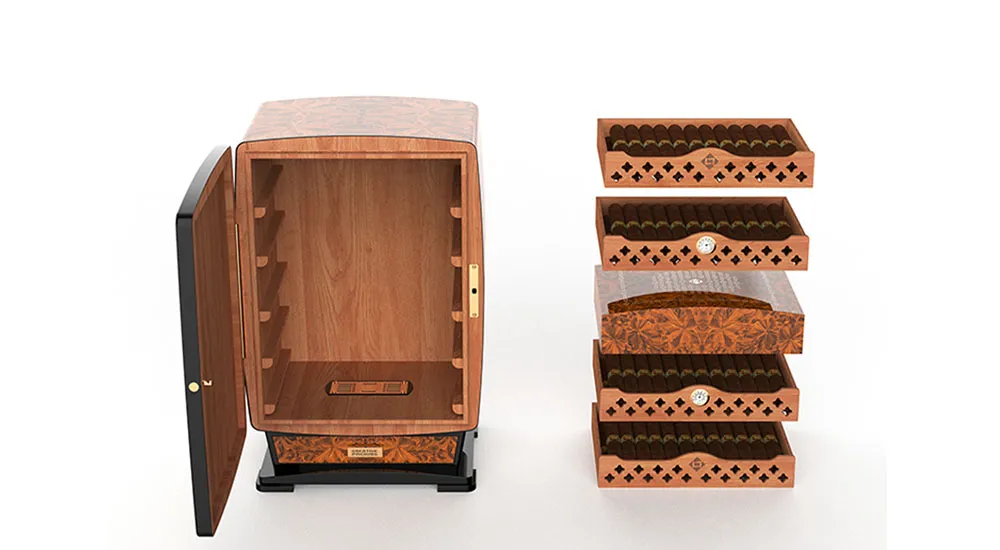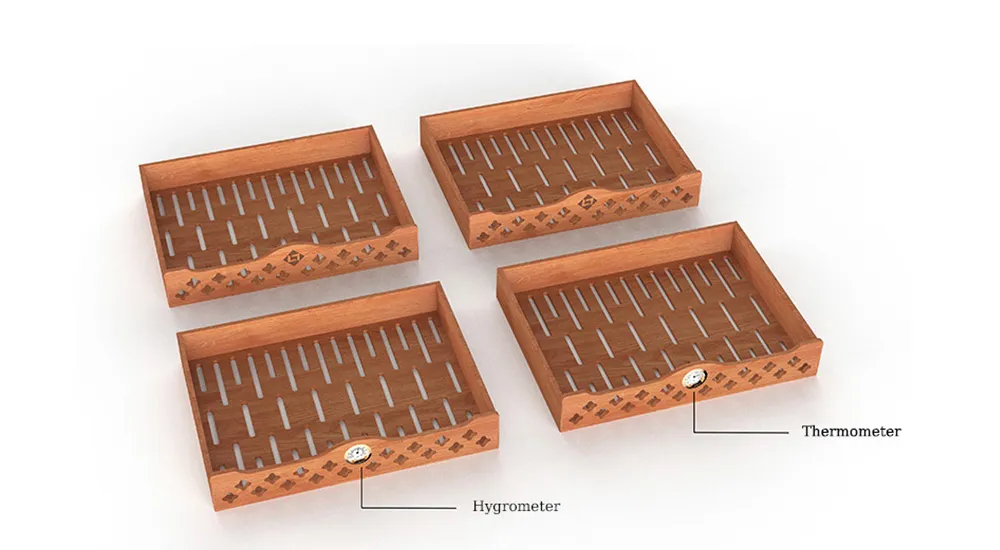-
Arabic
-
English
-
French
-
German
-
Italian
-
Spanish

Arabic

English

French

German

Italian

Spanish

For every cigar aficionado, cigars are more than just consumer goods or everyday items; they are precious collector's items. Keeping cigars in a humidor prolongs their lifespan, allowing them to develop a more complex and richer flavor over time, much like a fine wine.
A humidor is a specialized humidity-controlled container designed specifically for long-term cigar storage. Primarily constructed from Spanish cedar, it maintains the constant temperature and relative humidity (65%–72% RH) required for cigars, creating a stable climate.
The Times reported that due to the scarcity of Cuban cigars, a set of cigars and their accompanying luxurious humidor can fetch millions of euros at auction. At the 2025 annual cigar expo in Havana, Cuba, humidors ranged from basic $200 models to high-end, luxurious $2,000 models, demonstrating that fine humidors have become both works of art and collectibles.
A humidor cigar box features a humidity control system that regulates the humidity inside the box, preserving the flavor of the cigars and preventing them from drying out and pests.
Some cigar aficionados prefer to store their cigars in the cellophane wrapping, but this is not a good idea. Spanish cedar humidors allow air to circulate freely while resealed, while cellophane can cause a slight increase in temperature due to the greenhouse effect. Of course, if a dedicated humidor is not available, using the original packaging is most effective, but it all depends on how the owner chooses to store the cigars.
The importance of a humidor lies primarily in the delicate nature of the tobacco leaves. Cigars are made of organic matter and therefore easily deteriorate. However, if stored properly, they can age better, much like wine. In contrast, improperly stored tobacco leaves can dry out, rot, or become infested within a matter of days.
Cigar boxes or humidors are typically made of Spanish cedar, which not only imparts a woody aroma without detracting from the tobacco's flavor, but also protects against tobacco beetles. Furthermore, these boxes, combined with an internal humidity control system, act as a moisture buffer, retaining excess moisture and then releasing it during dry periods, thereby maintaining the overall freshness of the cigars.
The length of time cigars can be stored outside depends on the environment. Without moisture, a cigar exposed to dry air conditioning or heating can dry out in less than an hour. Generally speaking, without a humidor, cigars will only remain in good condition for two to three days at most. After that, the quality of the cigar begins to deteriorate significantly.
| Environment | Sealed? | Storage Time | Risk Notes |
|---|---|---|---|
| Dry air-conditioned room (e.g. office) | No | 1–2 days | Dries out quickly; wrapper may crack, flavor fades |
| Humid environment (e.g. tropical climate) | No | Up to 2–3 days | May absorb too much moisture; mold risk |
| Ziplock bag (no humidifier) | Yes | 2–5 days | Slows drying but humidity is still unstable |
| Ziplock bag + Boveda pack | Yes | Up to 1 week | Great for short trips or emergency storage |
| Airtight container + Boveda pack | Yes | Up to 2–3 weeks | More stable; still not ideal for long-term aging |
In a custom-made humidor made of high-quality cedar wood, cigars can last for 5–10 years, or even longer. Some Cuban cigars reach peak flavor after several years. However, it's important to regularly check the condition of your cigars during storage, and humidors with glass windows are recommended.
Regularly rotating cigars ensures that all cigars receive the same humidity, preventing moisture imbalance and ensuring even aging. Therefore, it's recommended to rotate each cigar every two to three months to ensure equal moisture absorption. When rotating cigars, use clean hands and be gentle to avoid damaging the tobacco leaves.
The humidity in a humidor should generally be between 65% and 75% relative humidity, with a temperature range of 64 to 70°F, or 18–21°C. Humidity in a typical home or office is around 50%, and placing cigars directly on a shelf can damage them. Humidors with digital temperature controls and automatic humidity regulators maintain a good balance.
To tell if a cigar has gone bad, you need to rely on your senses. You can check for visible mold, discoloration, and cracking on the surface. Another method is the pinch test: gently squeeze the cigar to check its firmness. If it's too soft, it's too moist. If it's too dry and crumbly, it's starting to dry out.

Consider the following factors:
Material: We recommend using Spanish cedar for the interior, as it is highly absorbent and insect-resistant, helping to stabilize humidity and releasing a unique aroma.
Capacity: Choose the appropriate size based on your collection and future plans. Remember not to overfill the humidor; leave ample space for air circulation.
Accessories: A high-precision hygrometer and humidification system are essential for monitoring the condition of your cigars.
Brand: We recommend choosing a professional cigar manufacturing company or factory, such as Creative Packing Luxury Packaging, which has 17 years of experience in the packaging industry and customizes cigar boxes for cigars worldwide. We also offer OEM and ODM services.
Contact us to customize your cigar humidor. We can provide a satisfactory solution for both small and large orders.